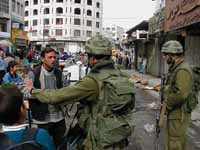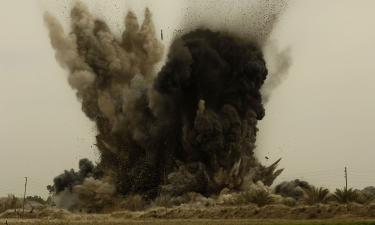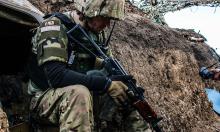Palestinians forced to leave homes in central Hebron: study
More than 40 percent of Palestinians living in the center of the West Bank city of Hebron, under Israeli control, have been forced to leave their homes, and more than 75 percent of their shops have shut down, according to a survey released Monday by two Israeli human rights groups.

B'Tselem and The Association for Civil Rights in Israel said the exit of Palestinians from the center of Hebron resulted from Israel's policy of separation between Jews and Arabs and hardships imposed on the local Palestinian population.
Hebron is believed by Jews and Muslims to be the site where biblical patriarchs were buried and is a frequent flashpoint. Israel controls the center, where about 500 settlers live in heavily-guarded enclaves among about 160,000 Palestinians. The Palestinians control the rest of the city.
The survey showed that at least 1,014 Palestinian housing units, which account for 41.9 percent of those in the area, are empty. Of these, 65 percent were vacated during the course of the second Palestinian uprising, which began in 2000.
B'Tselem spokeswoman Sarit Michaeli said the Palestinians were essentially forced to move because the army imposed strict limitations on their movement and livelihoods. She said by giving preference to the needs of the settlers and creating a separation based on ethnicity, the army has created a "ghost town" in central Hebron.
"They created conditions that made the Palestinians move," Michaeli said. "The army can't now say that they didn't know this was going to happen."
A military statement said the B'Tselem report failed to reflect the complexities of Hebron, the only West Bank city where Israelis and Palestinians live next to one another and where there are constant stabbing, shooting and fire-bombing attacks by militants on the Israelis, whose presence there is guaranteed by the Israeli government.
It said that restrictions imposed there were meant to maintain order and to protect life, for the benefit of both the Israelis and Palestinians in the city.
"In this complicated reality the military commander is required, and is fact obliged, to take such actions on purely security grounds," the statement said.
The B'Tselem report said that 1,829 Palestinian shops, which account for 76.6 percent of all the downtown businesses, are no longer open. Of these, 62.4 percent were closed during the course of the second Palestinian uprising.
Azzam al-Shiyoukhi, 49, said the army and settlers have stopped him from returning to his closed shop.
"It's even difficult to arrive to my shops to reopen them, they are in a closed area," he said. "The only ones who can enter that area are registered in the records as residents or settlers."
In addition to the army restrictions, Palestinians living in the Israel-controlled zone say they are frequent targets for harassment by settlers, who are among the most extreme in the West Bank. Clashes between the two sides are frequent.
David Wilder, a spokesman for the Jewish settlers, said many Palestinians left during the latest round of violence after the army imposed lengthy curfews "because our lives were in danger." He said, "We have never tried to throw anybody out, and we have not tried to keep anyone here."
In a statement, the settlers charged that the military is restricting their movements and labeled the B'Tselem report "an unbroken string of lies, distortions, and concealment of data."
Mufeed al-Sharabati, 35, said he was forced to leave his home in the old city of Hebron in 2002 because of settler violence.
"Dozens of settlers attacked my house at once, and they burned things inside the house," he said. "We called the Israeli police and the army, but nobody helped us."
He said after the attack, the army issued an order to close the house. He said he has since received numerous offers from settlers to buy the building.
Subscribe to Pravda.Ru Telegram channel, Facebook, RSS!





